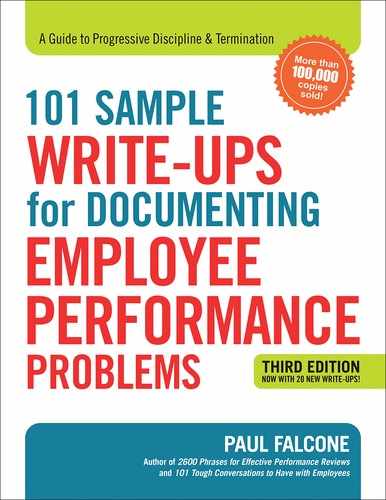#52 Poor Attitude3
Cashier fails to make eye contact with customers, doesn’t respond when she’s greeted, and appears to wish that she were somewhere else other than work.
PERFORMANCE CORRECTION NOTICE
Employee Name: Eileen Wolfram |
Department: Sales |
Date Presented: September 30, 2017 |
Supervisor: Sid Carpenter |
DISCIPLINARY LEVEL
![]() Verbal Correction—(To memorialize the conversation.)
Verbal Correction—(To memorialize the conversation.)
![]() Written Warning—(State nature of offense, method of correction, and action to be taken if offense is repeated.)
Written Warning—(State nature of offense, method of correction, and action to be taken if offense is repeated.)
![]() Investigatory Leave—(Include length of time and nature of review.)
Investigatory Leave—(Include length of time and nature of review.)
![]() Final Written Warning
Final Written Warning
![]() Without decision-making leave
Without decision-making leave
![]() With decision-making leave (Attach memo of instructions.)
With decision-making leave (Attach memo of instructions.)
![]() With unpaid suspension
With unpaid suspension
SUBJECT:Unsatisfactory work performance
![]() Policy/Procedure Violation
Policy/Procedure Violation
![]() Performance Transgression
Performance Transgression
![]() Behavior/Conduct Infraction
Behavior/Conduct Infraction
![]() Absenteeism/Tardiness
Absenteeism/Tardiness

Incident Description and Supporting Details: Include the following information: Time, Place, Date of Occurrence, and Persons Present as well as Organizational Impact.
Eileen,
As a cashier, your primary responsibility is to provide outstanding customer service to patrons who frequent our cafeteria. Over the past two months, I have seen you consistently fail to make eye contact with customers. You rarely look up from the register, and when you do, you look only at the customers’ hands as they pass you money. As a result, customers may feel alienated and less inclined to eat at our establishment in the future. In addition, I have heard visitors greet you with a good morning and/or a thank you, and you gave them no response. Yesterday, a long-time customer stated to me that it appears to her that you wish that you were somewhere else other than work. This reflects poorly on our establishment.
It is an essential job requirement to promptly and politely acknowledge the presence of others and to smile when serving a customer. You are consequently not meeting performance and conduct standards.
PERFORMANCE IMPROVEMENT PLAN
1. Measurable/Tangible Improvement Goals: Eileen, I expect you to greet customers with a friendly hello and a courteous thank you. I expect you to make eye contact and smile so that patrons feel welcome and at home. I also expect you to be more focused on your work and on the people around you so that you create an impression of caring and dedicated attention.
2. Training or Special Direction to Be Provided: I will arrange for you to attend an off-site customer service and sales training seminar to increase your skills and awareness in this area.
3. Interim Performance Evaluation Necessary? No
4. Our Employee Assistance Program (EAP) provider, Prime Behavioral Health Group, can be confidentially reached to assist you at (800) 555-5555. This is strictly voluntary. A booklet regarding the EAP’s services is available from Human Resources.
5. In addition, I recognize that you may have certain ideas to improve your performance. Therefore, I encourage you to provide your own Personal Improvement Plan Input and Suggestions:

(Attach additional sheets if needed.)
OUTCOMES AND CONSEQUENCES
Positive: I will remain available to help you and discuss areas where you require additional support. If you meet your performance goals, no further disciplinary action will be taken regarding this issue. In addition, you will develop a greater sense of your ability to contribute to our restaurant’s success.
Negative: You are now being placed on notice that if you fail to improve in these particular areas or if you violate any other standards of performance and conduct in the next sixty days, further disciplinary action up to and including dismissal may occur. A copy of this document will be placed in your personnel file.
Scheduled Review Date: None
EMPLOYEE COMMENTS AND/OR REBUTTAL

EMPLOYEE ACKNOWLEDGMENT GOES HERE
3 It is not good practice to discipline an employee for having a poor attitude. Attitude is a very subjective judgment that courts will dismiss because it is often associated with a mere difference of opinion or personality conflict. It is therefore critical that you avoid that term in the actual disciplinary notice or in the way you describe this to the employee verbally. Instead, use terms like “behavior” or “conduct.” Be sure to describe the objective behaviors that create a negative perception of the employee in the eyes of others. Only behaviors and actions that can be observed and documented may be presented as evidence in court.
